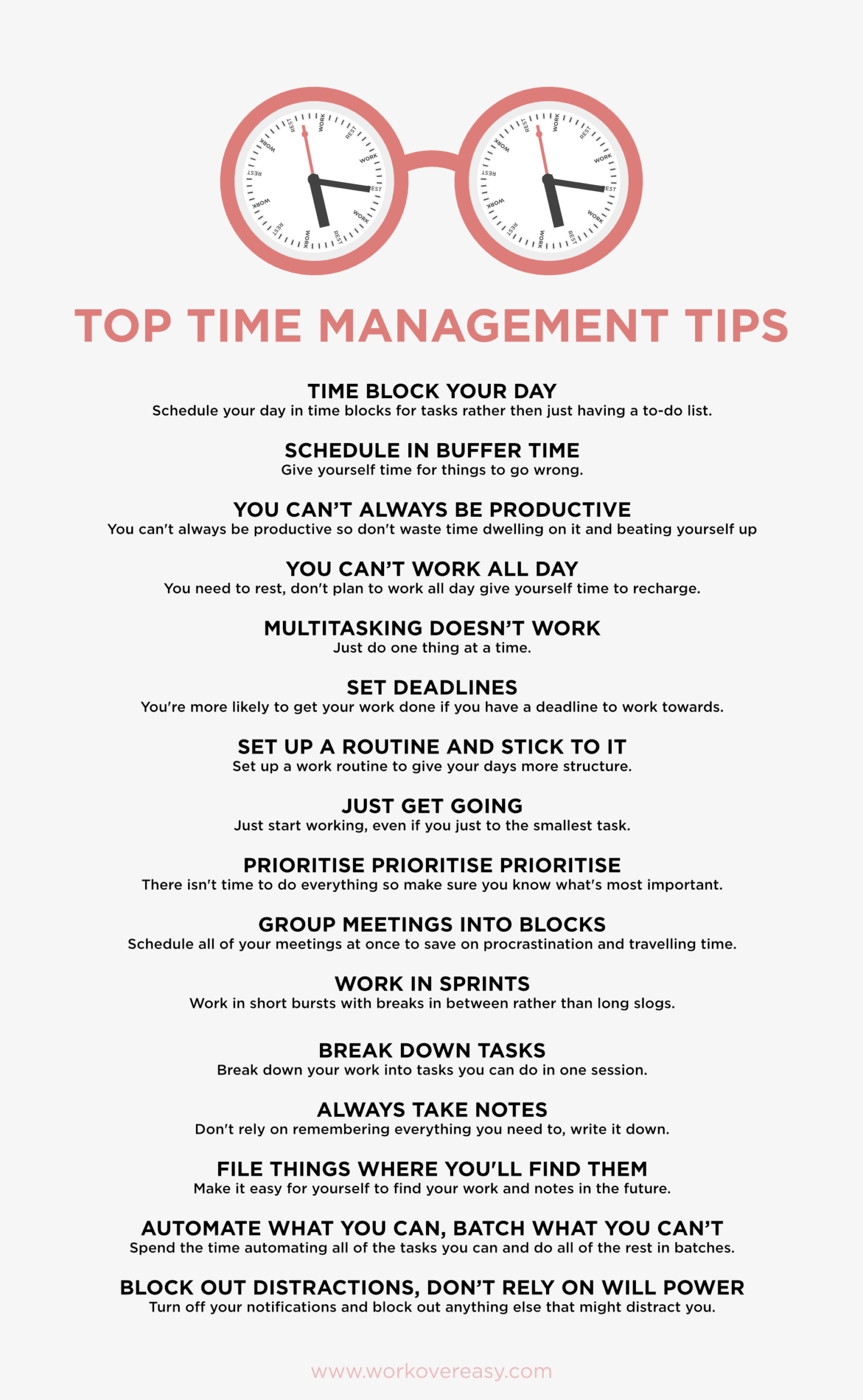Time management doesn’t work because it fails to address the underlying issues that cause poor productivity and disorganization. Poor time management may be a symptom of larger challenges such as lack of focus, prioritization skills, or an overwhelming workload.
Consequently, simply implementing time management techniques without tackling these underlying issues may not lead to sustainable improvements in productivity and efficiency.
In today’s fast-paced world, where everyone is constantly striving to do more in less time, time management has become a popular topic of discussion.
However, despite its widespread adoption, many individuals find themselves still struggling to effectively manage their time.
This begs the question: why doesn’t time management work? While time management techniques may provide temporary relief, they often fail to address the root causes that hinder productivity and organization.
We will explore the shortcomings of time management and shed light on the essential factors necessary for achieving true productivity and efficiency.
The Downside Of Traditional Time Management

When it comes to managing time effectively, traditional approaches may not always yield the desired results.
Many people have been led to believe that implementing one-size-fits-all solutions will magically solve their productivity woes.
However, the truth is that this approach can be counterproductive and hinder personal growth.
In this article, we will explore the downsides of traditional time management and why it often falls short in achieving long-term success.
The Myth Of One-size-fits-all Solutions
One of the primary reasons why time management strategies fail is the flawed belief in one-size-fits-all solutions.
While certain techniques may work for some individuals, they might not be effective for everyone.
Our diverse personalities, work styles, and preferences make it impossible to follow a rigid system that promises success for all.
Time management techniques, such as the Pomodoro Technique or Eisenhower Matrix, may work wonders for certain individuals, but they fail to consider the unique needs of others.
Instead of blindly following popular methods, it is important to understand and embrace our individuality.
Each person is unique and requires a customized approach to time management.
Recognizing this allows us to explore various strategies that align with our personal productivity style.
By identifying our strengths and weaknesses, we can develop a personalized time management system tailored to our specific needs and goals.
The Inability To Account For Individual Differences
Traditional time management approaches often overlook the importance of individual differences.
These strategies fail to recognize that productivity relies heavily on factors such as energy levels, cognitive function, and personal motivation.
While some individuals may thrive in early mornings, others may find their peak productivity hours lie in the late evening.
Moreover, time management techniques disregard the impact of external factors on our ability to manage time effectively.
Our personal circumstances, such as family responsibilities or health issues, can significantly impact our productivity levels.

By disregarding these individual differences, traditional time management fails to address the root causes of inefficiency.
To overcome these limitations, it is crucial to adopt a flexible and adaptable approach to time management.
By understanding our unique circumstances and energy patterns, we can optimize our productivity by scheduling tasks during our most productive hours.
For some, this might mean allocating time for deep work in the early mornings, while for others, it could mean prioritizing creative tasks during their most creative evenings.
The Flaws In Traditional Time Management Approaches
Traditional time management approaches have long been touted as the key to success and productivity.
However, upon closer examination, it becomes evident that these methods are inherently flawed.
They fail to consider important factors such as task quality, prioritization and flexibility, and personal productivity cycles.
In this blog post, we will explore these flaws in detail and shed light on why time management doesn’t work as effectively as it claims to.
Too Much Focus On Task Quantity Over Quality

One of the major flaws in traditional time management approaches is the excessive emphasis placed on the quantity of tasks rather than their quality.
The idea of accomplishing more tasks within a given time frame often leads individuals to overlook the importance of producing high-quality work.
This mindset can result in rushed outputs, hasty decision-making, and potential errors.
While completing a higher number of tasks may seem productive on the surface, the true value lies in delivering top-notch results.
It is essential to shift the focus from the number of tasks completed to the quality of each task accomplished.
Neglecting The Importance Of Prioritization And Flexibility
An inherent flaw in traditional time management approaches is the neglect of prioritization and flexibility.
These methods often rely on rigid schedules that allocate specific time slots to various tasks, without considering the ever-changing nature of work and life responsibilities.
By disregarding the need for dynamic prioritization and flexibility, individuals may find themselves overwhelmed and unable to adapt to unexpected events or shifting priorities.
It is crucial to recognize that effective time management involves the ability to prioritize tasks based on their importance and urgency, and to allocate time and resources accordingly.
Lack Of Consideration For Energy Levels And Personal Productivity Cycles

Another significant flaw in traditional time management approaches is the lack of consideration for individual energy levels and personal productivity cycles.
Everyone has unique times of the day when they feel more energized, focused, and productive.
Yet, traditional time management methods do not account for these natural variances in personal productivity cycles.
This oversight can result in unproductive periods when individuals try to push through tasks during their energy lulls, leading to decreased efficiency and potential burnout.
Recognizing and aligning one’s energy levels with the appropriate tasks is crucial for optimizing productivity and achieving better results.
By leveraging personal productivity cycles effectively, individuals can accomplish tasks more efficiently, with better focus and motivation.
Alternative Approaches To Time Management
Traditional time management techniques have long been promoted as the key to success, promising increased productivity and efficiency.
However, many individuals find that these approaches are not effective in the long run.
Fortunately, there are alternative methods that can help you effectively manage your time and achieve your goals.
In this blog post, we will explore three alternative approaches to time management that can revolutionize the way you work.
Embracing Personalized Time Management Techniques
One size does not fit all when it comes to time management.
Each person is unique with their own set of strengths, weaknesses, and preferences.
Instead of following generic time management systems, consider embracing personalized techniques that cater to your individual needs.
By doing so, you can optimize your productivity and stay motivated throughout the day.
Here are a few personalized time management techniques to consider:
- Identify your most productive times of the day and schedule your most important tasks during these periods.
- Break down your goals into smaller, manageable tasks to maintain focus and prevent overwhelm.
- Experiment with different productivity methods, such as the Pomodoro Technique or the Eisenhower Matrix, to find what works best for you.
Utilizing Productivity Tools And Technology
In today’s digital age, there is no shortage of productivity tools and technology designed to streamline your work and maximize efficiency.
By harnessing the power of these tools, you can gain better control over your time and accomplish more in less time.
Consider incorporating the following productivity tools into your daily routine:
- Project management software to track and prioritize your tasks.
- Note-taking apps or digital organizers to capture and organize your thoughts.
- Automation tools to delegate repetitive or time-consuming tasks.
- Time-tracking apps to monitor how you spend your time and identify areas for improvement.
Implementing Time Blocking And Task Batching Strategies
Time blocking and task batching are powerful strategies that can help you streamline your workflow and enhance your overall productivity.
These techniques involve grouping similar tasks together or scheduling specific blocks of time for specific activities.
Here’s how you can implement these strategies:
- Create a daily or weekly schedule and allocate dedicated time blocks for different activities such as email management, meetings, and focused work.
- Group related tasks together, such as content creation, research, or client meetings, to minimize context switching and improve efficiency.
- Set boundaries and communicate your availability during specific time blocks to minimize distractions and interruptions.
By implementing these alternative approaches to time management, you can revolutionize the way you work and achieve better results.
Embrace personalized techniques, utilize productivity tools and technology, and experiment with time blocking and task batching strategies to find what works best for you.
Take control of your time, enhance your productivity, and achieve your goals with these alternative approaches to time management.

Credit: www.workovereasy.com
The Role Of Mindset In Effective Time Management
When it comes to effective time management, many people rely on traditional strategies such as to-do lists, prioritization, and scheduling.
However, these methods often fall short in helping individuals truly optimize their time and achieve their goals.

This is where the role of mindset comes into play.
Adopting a growth mindset, recognizing the impact of procrastination and self-doubt, and embracing mindfulness and stress management techniques are all critical aspects to consider when it comes to truly effective time management.
1. Adopting A Growth Mindset For Better Time Management
In order to effectively manage our time, we must first adopt a growth mindset.
A growth mindset is the belief that our abilities and intelligence can be developed through dedication and hard work.
By viewing our time management skills as something that can be improved upon, we open ourselves up to learning and growth.
When we have a growth mindset, we are more likely to embrace challenges rather than shy away from them.
We see failure as an opportunity to learn and grow, rather than a setback.
This mindset allows us to be resilient, adaptable, and open to new strategies and approaches to managing our time.
2. Recognizing The Impact Of Procrastination And Self-doubt
Procrastination and self-doubt are common barriers to effective time management.
Recognizing the impact they have on our productivity is essential in overcoming them and improving our time management skills.
Procrastination often stems from a fear of failure or a lack of motivation.
By addressing the underlying reasons for our procrastination, we can better manage our time and increase our productivity.
This may involve breaking tasks down into smaller, more manageable steps, setting realistic goals, and finding ways to increase our motivation and accountability.
Self-doubt, on the other hand, can be a major roadblock to effective time management.
When we doubt our abilities or question our worth, we may find ourselves putting off tasks or avoiding them altogether.
Building self-confidence and cultivating a positive mindset are crucial in overcoming self-doubt and achieving our time management goals.
3. Embracing Mindfulness And Stress Management Techniques
In today’s fast-paced world, stress and overwhelm are common obstacles to effective time management.
By embracing mindfulness and stress management techniques, we can cultivate a sense of calm and focus, allowing us to make better use of our time.
Mindfulness involves being present and fully engaged in the task at hand, rather than being distracted or multitasking.
This allows us to be more efficient and productive, as well as reduce stress and improve our overall well-being.
Techniques such as deep breathing, meditation, and journaling can help us cultivate mindfulness and manage stress.
Additionally, taking regular breaks, prioritizing self-care, and setting boundaries are all important aspects of stress management.
By incorporating these practices into our daily lives, we can create a healthier and more balanced approach to managing our time.
Taking A Holistic Approach To Time Management
Enhancing time management effectiveness requires a holistic approach that goes beyond traditional methods.
Understanding why conventional time management tactics often fail is crucial to implementing more efficient strategies.
By taking a comprehensive view and addressing underlying issues, individuals can truly optimize their productivity and achieve long-term success.
When it comes to managing our time effectively, it’s easy to get caught up in traditional strategies that focus solely on productivity and tasks.
However, taking a holistic approach to time management is essential for long-term success and overall well-being.
By considering all aspects of our lives and prioritizing what truly matters, we can achieve a more balanced and fulfilling existence.
Let’s explore some key areas where this holistic approach can make a significant impact.
Balancing Work, Personal Life, And Self-care

In today’s fast-paced world, juggling work, personal life, and self-care can feel like an impossible task.
However, it’s crucial to find a balance that allows us to thrive in all areas.
Starting with work, it’s essential to prioritize tasks, set realistic goals, and maintain a healthy work-life integration.
By structuring our time and focusing on what truly matters, we can avoid burnout and enjoy a sense of fulfillment in our professional endeavors.
Equally important is nurturing our personal life, relationships, and hobbies.
Taking time to connect with loved ones, pursue passions, and enjoy leisure activities helps us recharge and brings joy to our lives.
By setting aside dedicated time for personal pursuits, we can nurture our well-being and maintain healthier relationships.
Lastly, self-care should never be overlooked. In the pursuit of productivity, we often neglect our own needs.
However, self-care is a vital aspect of a holistic approach to time management.
Whether it’s through exercise, meditation, or practicing mindfulness, taking time to care for our mental, physical, and emotional well-being is crucial.
By prioritizing self-care, we ultimately enhance our productivity, focus, and overall quality of life.
The Importance Of Setting Boundaries And Saying No
One of the key aspects of holistic time management is setting boundaries and learning to say no.
In a society that glorifies being busy and overcommitted, it can be challenging to establish boundaries and prioritize our time effectively.
However, setting clear limits on our availability and learning to say no to tasks that don’t align with our goals or values is crucial.
By doing so, we protect our time, energy, and focus, allowing us to invest in what truly matters and avoid unnecessary stress and overwhelm.
Fostering Healthy Habits And Time Management Rituals
In addition to setting boundaries, fostering healthy habits and implementing time management rituals are essential for a holistic approach to time management.
These rituals can include establishing a morning routine, scheduling regular breaks, and planning ahead.

By incorporating these practices into our daily lives, we create a structure that supports productivity, focus, and overall well-being.
These habits and rituals help us stay organized, reduce decision fatigue, and make the most of our time, ensuring we are consistently moving towards our goals.
Frequently Asked Questions For Why Time Management Doesn’t Work
Q1: How Can I Make My Time Management More Effective?
A1: Prioritize tasks, set realistic goals, eliminate distractions, and use time blocking techniques.
Q2: Why Do Traditional Time Management Methods Fail?
A2: They focus on schedules rather than energy levels and fail to consider individual needs and preferences.
Q3: Can Multitasking Improve Time Management?
A3: No, multitasking leads to decreased productivity and quality of work. Focus on one task at a time.
Q4: How Does Poor Time Management Affect Productivity?
A4: It leads to stress, missed deadlines, decreased motivation, and a feeling of being overwhelmed.
Q5: Is It Possible To Have A Work-life Balance With Good Time Management?
A5: Yes, effective time management allows for proper allocation of time to work, family, leisure, and self-care.
Q6: Does Technology Hinder Time Management Efforts?
A6: Technology can be both beneficial and detrimental. It is essential to use it wisely and avoid excessive distractions.
Q7: How Can Procrastination Be Overcome For Better Time Management?
A7: Break tasks into smaller, manageable parts, set deadlines, eliminate distractions, and practice discipline.
Q8: Can Time Management Methods Be Personalized?
A8: Yes, everyone has different preferences and needs. Customize your time management approach to suit your style.
Q9: Is It Possible To Achieve Time Management Without Feeling Overwhelmed?
A9: Yes, by breaking tasks into smaller steps, setting realistic goals, and practicing self-care regularly.
Q10: What Are The Long-term Benefits Of Effective Time Management?
A10: Improved productivity, reduced stress, better work-life balance, increased satisfaction, and personal growth.
Conclusion
To sum up, while time management techniques have long been advocated as the key to productivity, they may not be as effective as we think.
Rather than simply trying to squeeze more tasks into our already busy schedules, it is crucial to prioritize and focus on what truly matters.
By letting go of the limitations of traditional time management, we can explore alternative approaches that align with our individual needs and goals, leading us to true success and fulfillment.
So, instead of relying solely on time management, let’s embrace a more holistic approach to productivity.


